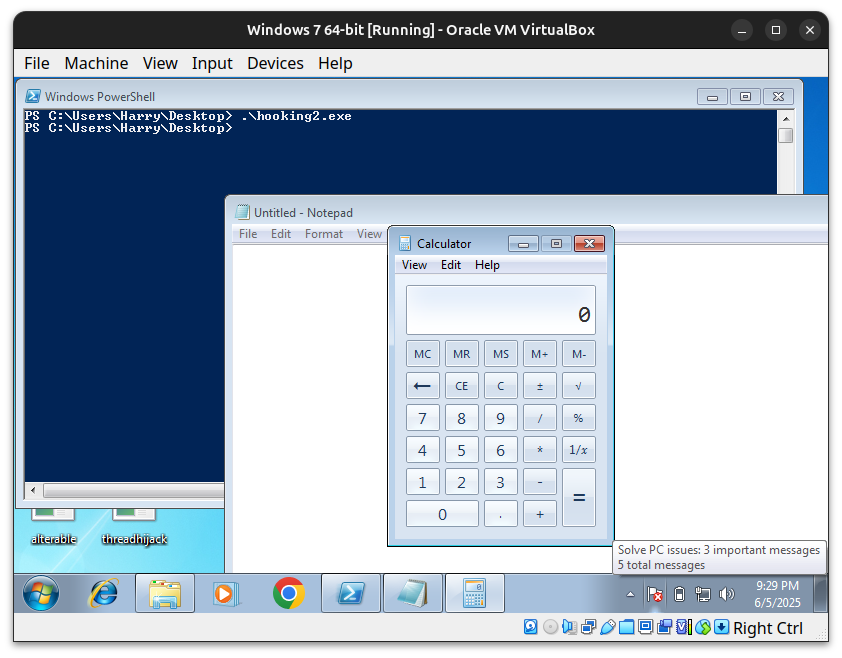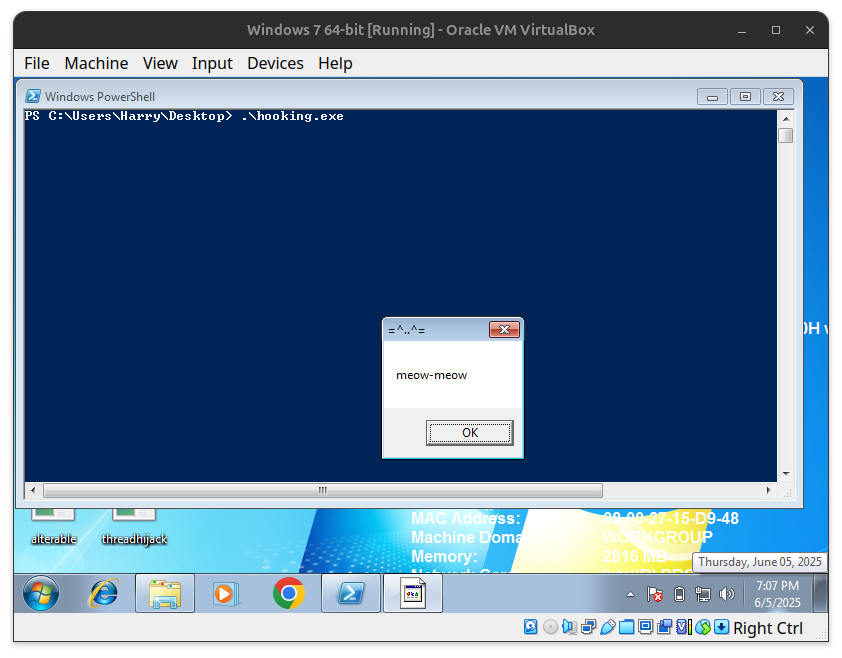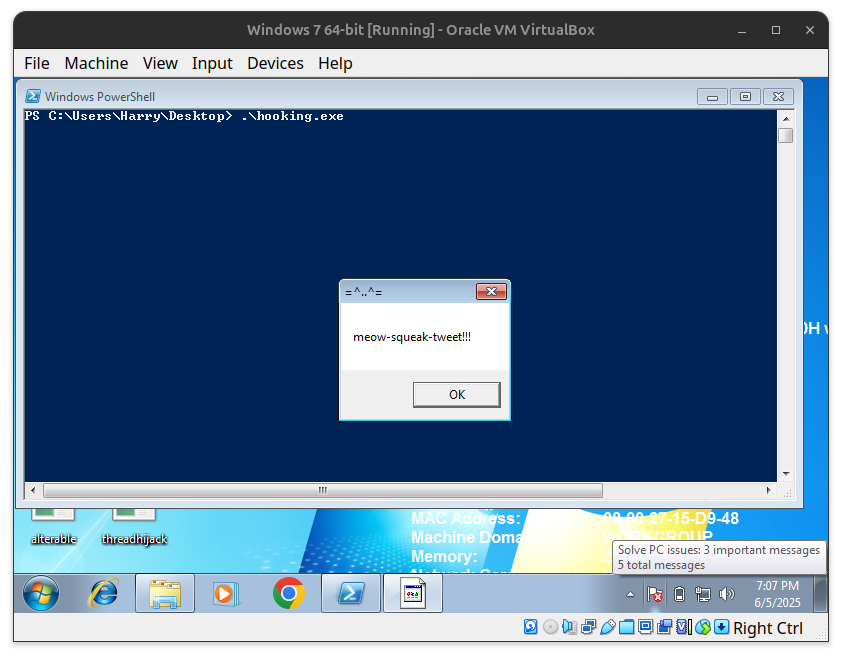What is an API Call?
- An API (Application Programming Interface) is a set of functions provided by the operating system or a library — like
CreateFile(),ReadProcessMemory(), orMessageBox(). - These functions are called by programs to interact with the system, hardware, or other programs.
What is Hooking?
- Hooking means intercepting a function call so that you can run your own code before, after, or instead of the original function.
Think of it as placing a “trap” or “detour” on a function.---
What is API Hooking Specifically?
It’s the act of modifying or intercepting calls to standard system functions (APIs) — such as Windows API functions.
There are many ways to do it:
- Modify function pointers (like in
IAT, the Import Address Table), - Overwrite function code (e.g., with a jump to your own code),
- Use system-level hooks (
SetWindowsHookEx), etc.
How Antivirus (AV) Uses It.
- Antivirus and EDR (Endpoint Detection and Response) tools hook common Windows APIs to:
- Detect suspicious behavior (like injecting code into another process),
- Log sensitive calls (like
WriteProcessMemory,NtCreateThreadEx), - Block dangerous operations in real time.
So, API hooking is used both offensively (by malware) and defensively (by security software).
Simple dll Code
//pet.dll
#include <windows.h>
#pragma comment (lib, "user32.lib")
BOOL APIENTRY DllMain(HMODULE hModule, DWORD ul_reason_for_call, LPVOID lpReserved) {
switch (ul_reason_for_call) {
case DLL_PROCESS_ATTACH:
break;
case DLL_PROCESS_DETACH:
break;
case DLL_THREAD_ATTACH:
break;
case DLL_THREAD_DETACH:
break;
}
return TRUE;
}
extern "C" {
__declspec(dllexport) int _cdecl Cat(LPCTSTR say) {
MessageBox(NULL, say, "=^..^=", MB_OK);
return 1;
}
}
extern "C" {
__declspec(dllexport) int _cdecl Mouse(LPCTSTR say) {
MessageBox(NULL, say, "<:3()~~", MB_OK);
return 1;
}
}
extern "C" {
__declspec(dllexport) int _cdecl Frog(LPCTSTR say) {
MessageBox(NULL, say, "8)~", MB_OK);
return 1;
}
}
extern "C" {
__declspec(dllexport) int _cdecl Bird(LPCTSTR say) {
MessageBox(NULL, say, "<(-)", MB_OK);
return 1;
}
}We have created a DLL which exported function: Cat, Mouse, Frog, Brid with one parameter.
And in output it just pop-up a message.
Compile
x86_64-w64-mingw32-gcc -shared -o pet.dll pet.cpp -fpermissiveC Code
//cat.cpp
#include <windows.h>
typedef int (__cdecl *CatProc)(LPCTSTR say);
typedef int (__cdecl *BirdProc)(LPCTSTR say);
int main(void) {
HINSTANCE petDll;
CatProc catFunc;
BirdProc birdFunc;
BOOL freeRes;
petDll = LoadLibrary("pet.dll");
if (petDll != NULL) {
catFunc = (CatProc) GetProcAddress(petDll, "Cat");
birdFunc = (BirdProc) GetProcAddress(petDll, "Bird");
if ((catFunc != NULL) && (birdFunc != NULL)) {
(catFunc) ("meow-meow");
(catFunc) ("mmmmeow");
(birdFunc) ("tweet-tweet");
}
freeRes = FreeLibrary(petDll);
}
return 0;
}Compile and Run
Compile
x86_64-w64-mingw32-g++ -O2 cat.cpp -o cat.exe \
-mconsole -I/usr/share/mingw-w64/include/ -s \
-ffunction-sections -fdata-sections -Wno-write-strings \
-fno-exceptions -fmerge-all-constants -static-libstdc++ \
-static-libgcc -fpermissiveRun
.\cat.exe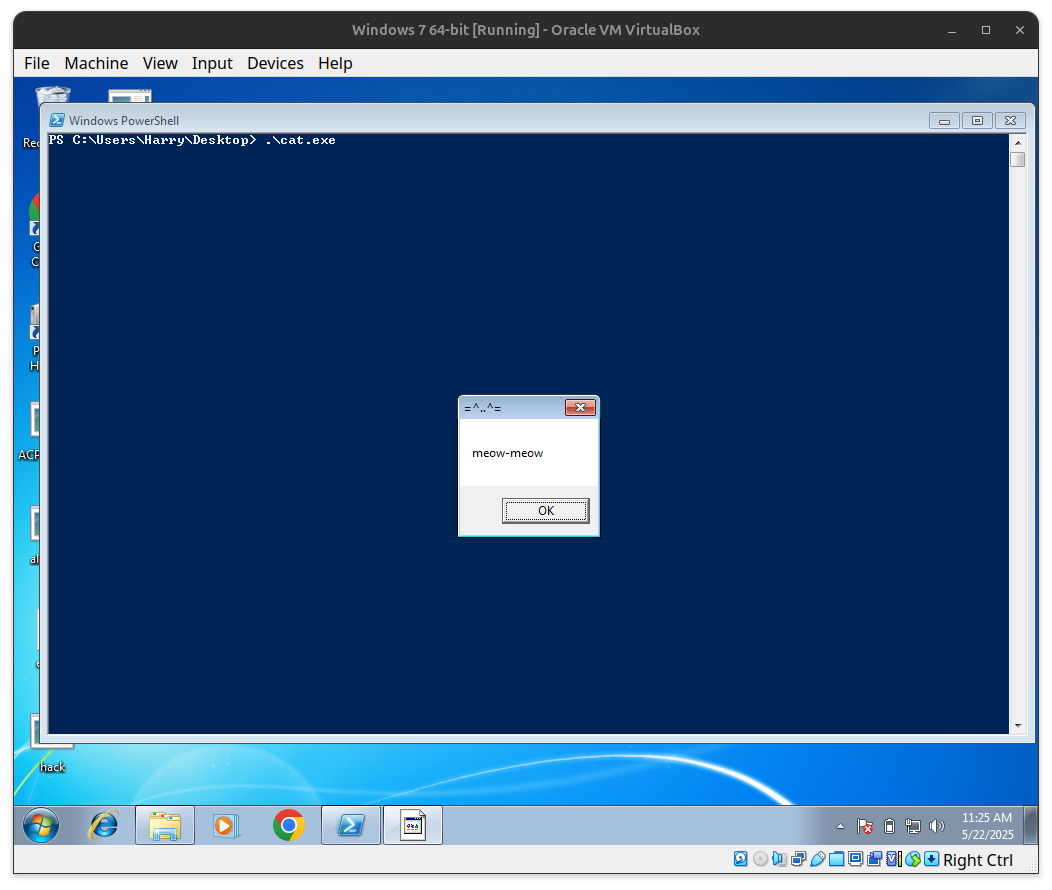
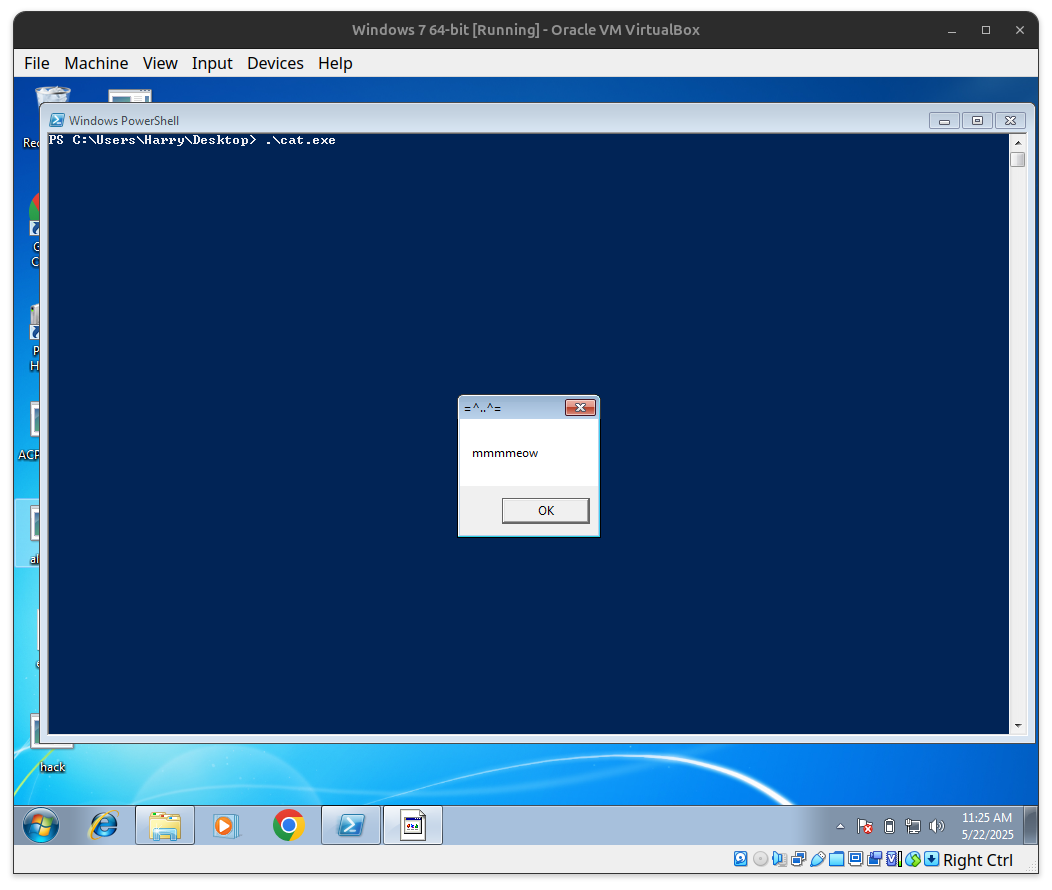
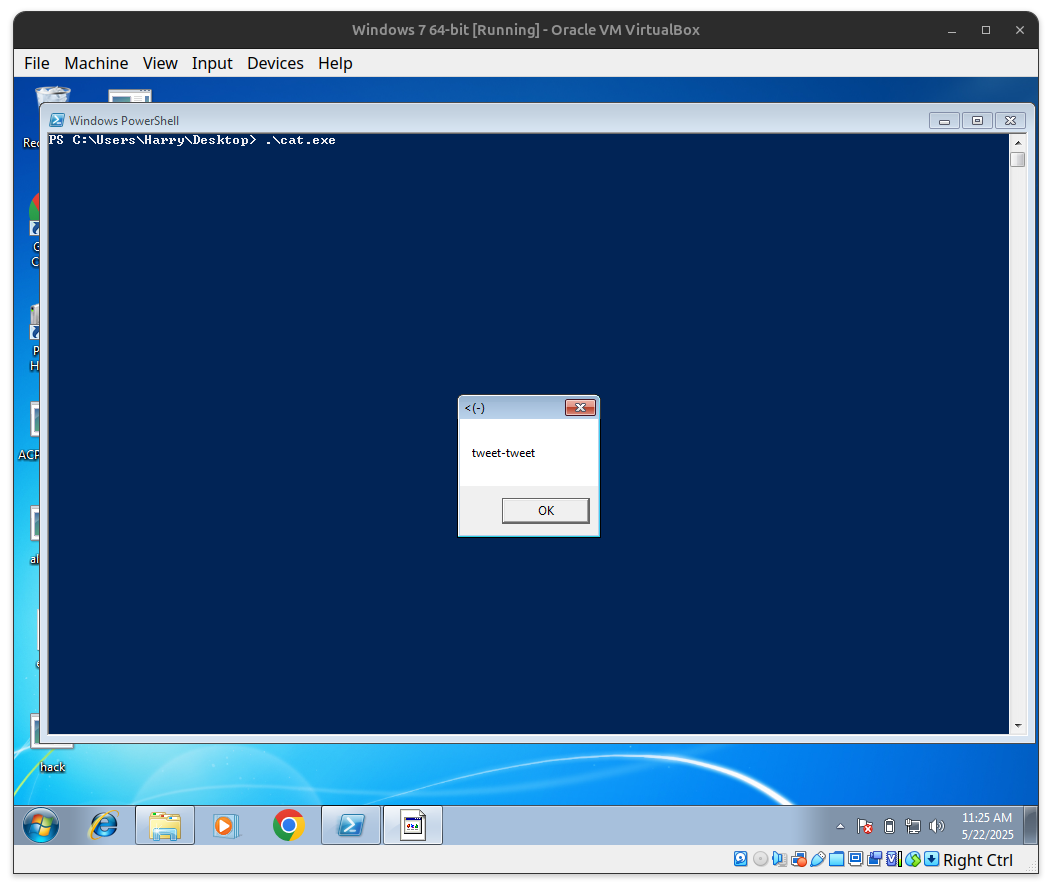
Simple hooking
Program 1
Code
//hooking.cpp
#include <windows.h>
#include <stdio.h>
// Function pointer type
typedef int (__cdecl *CatProc)(LPCTSTR);
// Buffer for saving original bytes
char originalBytes[12];
FARPROC hookedAddress;
// Our hook function
int __stdcall myFunc(LPCTSTR say) {
HINSTANCE petDll;
CatProc catFunc;
// Unhook the function
DWORD oldProtect;
VirtualProtect((LPVOID)hookedAddress, 12, PAGE_EXECUTE_READWRITE, &oldProtect);
memcpy((LPVOID)hookedAddress, originalBytes, 12);
VirtualProtect((LPVOID)hookedAddress, 12, oldProtect, &oldProtect);
// Call the original function with modified text
petDll = LoadLibrary("pet.dll");
catFunc = (CatProc) GetProcAddress(petDll, "Cat");
return (catFunc)("meow-squeak-tweet!!!");
}
// Hooking logic
void setMySuperHook() {
HINSTANCE hLib;
void* myFuncAddress;
uintptr_t myFuncAddr;
CHAR patch[12] = {0};
DWORD oldProtect;
// Load pet.dll and get the Cat function address
hLib = LoadLibraryA("pet.dll");
hookedAddress = GetProcAddress(hLib, "Cat");
// Save original bytes
VirtualProtect((LPVOID)hookedAddress, 12, PAGE_EXECUTE_READWRITE, &oldProtect);
memcpy(originalBytes, (LPCVOID)hookedAddress, 12);
myFuncAddress = (void*)&myFunc;
myFuncAddr = (uintptr_t)myFuncAddress;
// Build the patch: mov rax, myFuncAddr; jmp rax
patch[0] = 0x48; // REX.W
patch[1] = 0xB8; // MOV RAX, imm64
memcpy(patch + 2, &myFuncAddr, 8);
patch[10] = 0xFF; // JMP RAX
patch[11] = 0xE0;
// Write the patch
memcpy((LPVOID)hookedAddress, patch, 12);
VirtualProtect((LPVOID)hookedAddress, 12, oldProtect, &oldProtect);
}
int main() {
HINSTANCE petDll;
CatProc catFunc;
// Load pet.dll and call original Cat
petDll = LoadLibrary("pet.dll");
catFunc = (CatProc) GetProcAddress(petDll, "Cat");
(catFunc)("meow-meow");
// Install hook
setMySuperHook();
// Call Cat again, now it will trigger myFunc
(catFunc)("meow-meow");
return 0;
}
Explanation
#include <windows.h>
#include <stdio.h>Includes the Windows API headers (windows.h) and standard I/O (stdio.h).
typedef int (__cdecl *CatProc)(LPCTSTR);Defines a function pointer type named CatProc.
This means:
- A function that returns
int - Takes a single
LPCTSTR(string literal or pointer to a constant string) - Uses the
__cdeclcalling convention (standard on Windows)
char originalBytes[12];
FARPROC hookedAddress;originalBytes[12]: Buffer to save the original first 12 bytes of the target function (Cat) before we overwrite it (so we can restore them later).hookedAddress: Stores the address of the target function (Catinpet.dll).
int __stdcall myFunc(LPCTSTR say) {- Defines a new function
myFuncthat uses the__stdcallcalling convention. - This will replace the original
Catfunction after hooking!
HINSTANCE petDll;
CatProc catFunc;Variables for:
petDll: Handle to the loaded DLL (pet.dll)catFunc: Function pointer to the realCatfunction
DWORD oldProtect;
VirtualProtect((LPVOID)hookedAddress, 12, PAGE_EXECUTE_READWRITE, &oldProtect);
memcpy((LPVOID)hookedAddress, originalBytes, 12);
VirtualProtect((LPVOID)hookedAddress, 12, oldProtect, &oldProtect);- This block restores the original first 12 bytes (undoes the hook) to safely call the real
Catfunction. VirtualProtecttemporarily changes memory protection to allow write access to the target memory region.
petDll = LoadLibrary("pet.dll");
catFunc = (CatProc) GetProcAddress(petDll, "Cat");
return (catFunc)("meow-squeak-tweet!!!");
}- Loads the real
pet.dll - Retrieves the real
Catfunction’s address - Calls
Catwith modified input"meow-squeak-tweet!!!"instead of what was originally passed to the hook - Returns the result of the real
Catfunction
Hooking logic:
setMySuperHook()
void setMySuperHook() {- Function to install the hook!
HINSTANCE hLib;
void* myFuncAddress;
uintptr_t myFuncAddr;
CHAR patch[12] = {0};
DWORD oldProtect;Local variables:
hLib: handle topet.dllmyFuncAddress: pointer tomyFuncmyFuncAddr: the actual address ofmyFunc(converted to integer type)patch: buffer to store the 12-byte trampoline (hook)oldProtect: for restoring memory protection
hLib = LoadLibraryA("pet.dll");
hookedAddress = GetProcAddress(hLib, "Cat");- Loads the target DLL (
pet.dll) - Finds the address of the
Catfunction to hook
VirtualProtect((LPVOID)hookedAddress, 12, PAGE_EXECUTE_READWRITE, &oldProtect);
memcpy(originalBytes, (LPCVOID)hookedAddress, 12);- Temporarily makes the first 12 bytes of
Catwritable - Copies those bytes into
originalBytesbuffer so we can restore them later
myFuncAddress = (void*)&myFunc;
myFuncAddr = (uintptr_t)myFuncAddress;- Gets the actual address of our hook function
myFuncand stores it as an integer
patch[0] = 0x48; // REX.W prefix: 64-bit instruction
patch[1] = 0xB8; // MOV RAX, imm64
memcpy(patch + 2, &myFuncAddr, 8);
patch[10] = 0xFF; // JMP RAX
patch[11] = 0xE0;Builds a 12-byte trampoline for 64-bit hooking:
0x48 0xB8: MOV RAX, immediate 64-bit address- 8 bytes: the address of
myFunc 0xFF 0xE0: JMP RAX (jump to ourmyFunc)
This effectively redirects execution tomyFuncwhenCatis called!
memcpy((LPVOID)hookedAddress, patch, 12);
VirtualProtect((LPVOID)hookedAddress, 12, oldProtect, &oldProtect);
}- Writes the trampoline to the start of
Cat - Restores the original memory protection
Main function
int main() {
HINSTANCE petDll;
CatProc catFunc;- Standard
main()entry point - Load
pet.dlland prepare to callCatnormally
petDll = LoadLibrary("pet.dll");
catFunc = (CatProc) GetProcAddress(petDll, "Cat");- Loads the DLL and finds the real
Catfunction
(catFunc)("meow-meow");- Calls the original
Catfunction — it shows a message box"meow-meow".
setMySuperHook();- Installs the hook — overwrites the
Catfunction’s first 12 bytes to redirect it tomyFunc.
(catFunc)("meow-meow");- Calls
Catagain — but now it runsmyFuncinstead of the originalCat. myFuncrestores the original bytes, loads the realCatagain, and calls it with"meow-squeak-tweet!!!"
return 0;
}- Program ends.
Compile and Run
Compile
x86_64-w64-mingw32-g++ hooking.cpp -o hooking.exe -static -luser32 -lkernel32Move hooking.exe and pet.dll to Window 7(64-bit)\
Run
Program 2
Code
//hooking2.cpp
#include <windows.h>
#include <stdio.h>
char originalBytes[12];
FARPROC hookedAddress;
// The replacement function
int __stdcall myFunc(LPCSTR lpCmdLine, UINT uCmdShow) {
// Restore the original bytes
DWORD oldProtect;
VirtualProtect((LPVOID)hookedAddress, 12, PAGE_EXECUTE_READWRITE, &oldProtect);
memcpy((LPVOID)hookedAddress, originalBytes, 12);
VirtualProtect((LPVOID)hookedAddress, 12, oldProtect, &oldProtect);
// Launch calculator instead
return WinExec("calc.exe", uCmdShow);
}
// Hooking logic (64-bit safe)
void setMySuperHook() {
HINSTANCE hLib;
void* myFuncAddress;
uintptr_t myFuncAddr;
CHAR patch[12] = {0};
DWORD oldProtect;
// Get memory address of WinExec
hLib = LoadLibraryA("kernel32.dll");
hookedAddress = GetProcAddress(hLib, "WinExec");
// Save the first 12 bytes
VirtualProtect((LPVOID)hookedAddress, 12, PAGE_EXECUTE_READWRITE, &oldProtect);
memcpy(originalBytes, (LPCVOID)hookedAddress, 12);
myFuncAddress = (void*)&myFunc;
myFuncAddr = (uintptr_t)myFuncAddress;
// Build the patch: mov rax, myFuncAddr; jmp rax
patch[0] = 0x48; // REX.W
patch[1] = 0xB8; // MOV RAX, imm64
memcpy(patch + 2, &myFuncAddr, 8);
patch[10] = 0xFF; // JMP RAX
patch[11] = 0xE0;
// Write the patch
memcpy((LPVOID)hookedAddress, patch, 12);
VirtualProtect((LPVOID)hookedAddress, 12, oldProtect, &oldProtect);
}
int main() {
// Call original WinExec
WinExec("notepad", SW_SHOWDEFAULT);
// Install hook
setMySuperHook();
// Call again → this should trigger your hook
WinExec("notepad", SW_SHOWDEFAULT);
return 0;
}Explanation
int __stdcall myFunc(LPCSTR lpCmdLine, UINT uCmdShow) {- This is the hook (replacement) function that replaces
WinExec.
return WinExec("calc.exe", uCmdShow);
}- Instead of running the original command, we force
WinExecto launch"calc.exe"(Calculator). - After restoring the real
WinExec, it’s safe to call it directly.
// Get memory address of WinExec
hLib = LoadLibraryA("kernel32.dll");
hookedAddress = GetProcAddress(hLib, "WinExec");- Dynamically loads
kernel32.dlland finds the address ofWinExec.
Main Function
// Call original WinExec
WinExec("notepad", SW_SHOWDEFAULT);- Calls
WinExecnormally, launching Notepad.
// Install hook
setMySuperHook();- Installs the hook that redirects
WinExectomyFunc.
// Call again → this should trigger your hook
WinExec("notepad", SW_SHOWDEFAULT);- Calls
WinExecagain. - But this time, it jumps to
myFunc(hooked). myFunclaunches Calculator instead of Notepad.
Compile and Run
Compile
x86_64-w64-mingw32-g++ hooking2.cpp -o hooking2.exe -static -luser32 -lkernel32Move hooking2.cpp to Windows 7 (64-bit).
